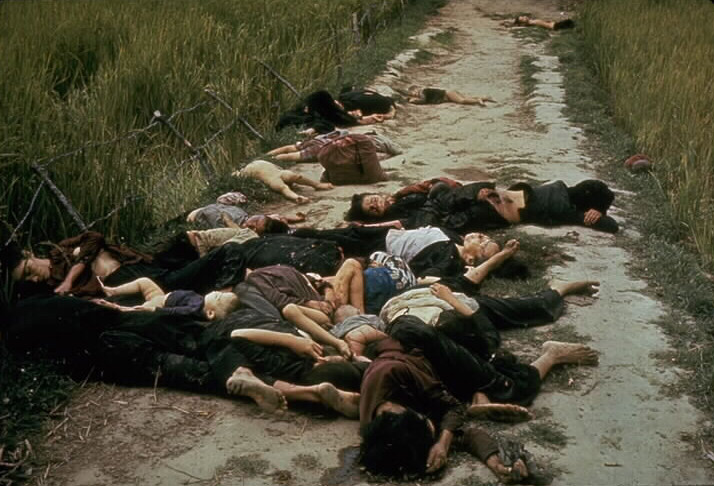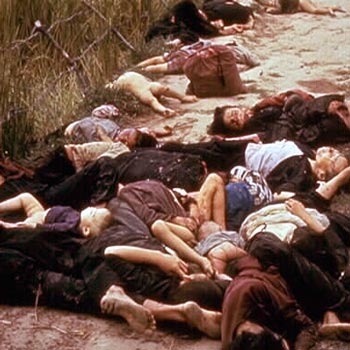
US Army Major Colin Powell
Forty years ago this week, on March 16, 1968, a company of US Army combat soldiers from the Americal Division swept into the South Vietnamese hamlet of My Lai, rounded up the 500+ unarmed, non-combatant residents, all women, children, babies and a few old men, and executed them in cold blood, Nazi-style. No weapons were found in the village, and the whole operation took only 4 hours.

 \
\
Although there was a serious attempt to cover-up this operation (which involved a young up-and-coming US Army Major named Colin Powell), those who orchestrated or participated in this “business-as-usual” war zone atrocity did not deny the details of the slaughter when the case came to trial several years later. But the story had filtered back to the Western news media, thanks to a couple of courageous eye-witnesses whose consciences were still intact. An Army court-marital trial eventually convened against a handful of the soldiers, including Lt. William Calley and Company C commanding officer, Ernest Medina.

Lt. William Calley
According to many of the soldiers in Company C, Medina ordered the killing of “every living thing in My Lai,” including, obviously, innocent noncombatants - men, women, children and even farm animals. Lt. Calley was charged with the murder of 109 civilians. In his defense statement he stated that he had been taught to hate all Vietnamese, even children, who, he had been told, “were very good at planting mines.”
That a massacre had occurred was confirmed by many of Medina’s soldiers and recorded by photographers, but the Army still tried to cover it up. The cases were tried in military courts with juries of Army officers, who eventually either dropped the charges against all of the defendants (except Calley) or acquitted them. Medina and all the others who were among the killing soldiers that day went free, and only Calley was convicted of the murders of “at least 20 civilians.” He was sentenced to life imprisonment for his war crime, but, under pressure from patriotic pro-war Americans, President Nixon pardoned him within weeks of the verdict.
The trial stimulated a lot of interest because it occurred during the rising outcry of millions of Americans against the infamous undeclared war that was acknowledged by many observers as an “overwhelming atrocity.” Ethical Americans were sick of the killing. However, 79% of those that were polled strenuously objected to Calley’s conviction, some veteran’s groups even voicing the opinion that instead of condemnation, he and his comrades should have received medals of honor for killing “Commie Gooks.”
Just like the extermination camp atrocities of World War II, the realities of My Lai deserve to be revisited so that it will happen “never again.” The Vietnam War was an excruciating time for conscientious Americans because of the numerous moral issues surrounding the mass slaughter in a war that uselessly killed 58,000 American soldiers, caused the spiritual deaths of millions more, killed 3 million Vietnamese (mostly civilians) and psychologically traumatized countless others on both sides of the conflict.
Of course the Vietnam War was a thousand times worse for the innocent people of that doomed land than it was for the soldiers. The Vietnamese people were victims of an army of brutal young men from a foreign land who were taught that the “little yellow people” were pitiful sub-humans and deserved to be killed - with some GIs preferring to inflict torture first. “Kill-or-be-killed” is a reality that is standard operating procedure for military combat units of every nation of every era and of every ideology.
Vietnam veterans tell me that there were scores, maybe hundreds, of “My Lai-type massacres “ during that war. Not surprisingly, the Pentagon refuses to acknowledge that truth. Execution-style killings of “potential” Viet Cong sympathizers (i.e., anybody that wasn’t a US military supporter) were common. Many combat units “took no prisoners” (a euphemism for murdering captives, rather than having to follow the nuisance Geneva Conventions which requires humane treatment for prisoners of war). The only unusual thing about the My Lai Massacre was that it was eventually found out. The attempted Pentagon cover-up failed but justice was still not done.
Very few soldiers or their commanding officers have ever been punished for the many war crimes that occurred during that war because those in charge knew that killing (and torturing) of innocent civilians during war-time is simply the norm – excused as “collateral damage.” After all, as US Secretary of Defense Donald Rumsfeld later infamously proclaimed, “stuff happens.”
The torture was enjoyable for some - for awhile (witness Auschwitz yesterday and Abu Graib and Guantanamo Bay today). And wars are profitable for many - and still are (witness the Krupp family of Nazi-era infamy and Halliburton, the Blackwater mercenaries, et al. today).
The whole issue of the justification of war, with its inherent atrocities, never seems to be thoroughly examined in an atmosphere of openness and historical honesty. Full understanding of the realities of war and its spiritual, psychological and economic consequences for the victims is rarely attempted. If we who are non-soldiers ever truly experienced the horrors of combat, the effort to abolish war would suddenly be a top priority (perhaps even for the current crop of “Chicken Hawk” warmongers in the Bush Administration).
If we actually knew the gruesome realities of war (or even understood the immorality of spending trillions of dollars on war preparation while hundreds of millions of people are homeless and starving) we would refuse to cooperate with the things that make for war. But that wouldn’t be good for the war profiteers. So those “merchants of death” must hide the gruesome truths and try instead to make war seem patriotic and honorable, with flag-waving sloganeering like “Be All That You Can Be.” Or they might try to convince the soon-to-be-childless mothers of doomed, dead or dying soldiers that their child had died fighting for God, Country and Honor instead of domination of the Middle East’s oil reserves.
Let’s face it. The US military standing army system has been bankrupting America at $500+ billion year after year after year – even in times of so-called “peace.” The warmongering legacy of the Pentagon is still with us, particularly among those “patriots” including GOP presidential candidate John McCain, who wanted to “nuke the gooks” in Vietnam. A multitude of un-elected policy-makers of that ilk are still in charge of US foreign policy today, and they have been solidifying their power to continue America’s misbegotten, unaffordable and unsustainable militarism with the huge profits made off the deaths, screams, blood, guts and permanent disabilities of those hood-winked soldiers who were told that they were ”saving the world for democracy” when in fact they were making the world safe for exploitive capitalism and obscene profits for the few. And the politicians entrenched in both major political parties, who are all-too-often paid lapdogs for the war profiteers, don’t want the gravy train to be derailed.
Things haven’t changed much even from the World War II mentality that conveniently overlooked the monstrous evil that was perpetrated on tens of thousands of unarmed, innocent civilians at Nagasaki on August 9, 1945, a war crime so heinous that the psychological consequences, immune deficiency disorders and cancers from that nuclear holocaust are still being experienced in unimaginable suffering 6 decades later.
Things haven’t really changed when one witnesses the political mentality that allows the 500,000 deaths of innocent Iraqi civilians in the aftermath of the first Gulf War or the 1,000,000 civilian deaths in the current fiasco in Iraq.
So it appears that our military and political leaders haven’t learned anything since My Lai. The people sitting next to you at work are, like most unaware Americans, almost totally ignorant of the hellish realities of the war-zone, so they may continue to be blindly patriotic and indifferent to the plight of the “others” who suffer so much in war. They may think that some people are less than human, and, therefore, if necessary, can be justifiably killed “for Volk, Fuhrer und Vaterland.”
As long as most American citizens continue to glorify war and militarism and ignore or denigrate the peacemakers; as long as the American public endorses the current spirit of nationalism and ruthless global capitalism; and as long as the America’s political leadership remains prudently silent (and therefore consenting to the homicidal violence of war) we will not be able to effect a change away from the influence of conscienceless war-mongers and war profiteers. The prophets and peacemakers are never valued in militarized nations, especially in times of war; indeed, they are always marginalized, demeaned and even imprisoned as traitors. And one of the reasons is that there are no profits to be made in peacemaking, whereas there are trillions to be made in the biggest business going: the preparation for war, the execution of war and the highly profitable “re-building” efforts (“blow it up/build it up” economics), all the while ignoring the “inconvenient” but inevitable collateral damage to the creation and its creatures.
As long as we continue to be led by unapologetic and merciless war-makers and their wealthy business cronies and as long as the ethical infants in Washington, DC continue to be corrupted by the big money bribes, there is no chance America will ever obtain true peace.
And unless America stops the carnage, fully repents and offers compensation for the damage it has done, its turn as a recipient of retaliatory violence will surely come, and it will come from those foreign and domestic victims that our nation’s leaders have treated so shamefully over the past half-century.
March 2008 - Gary G. Kohls, MD, Duluth, MN
